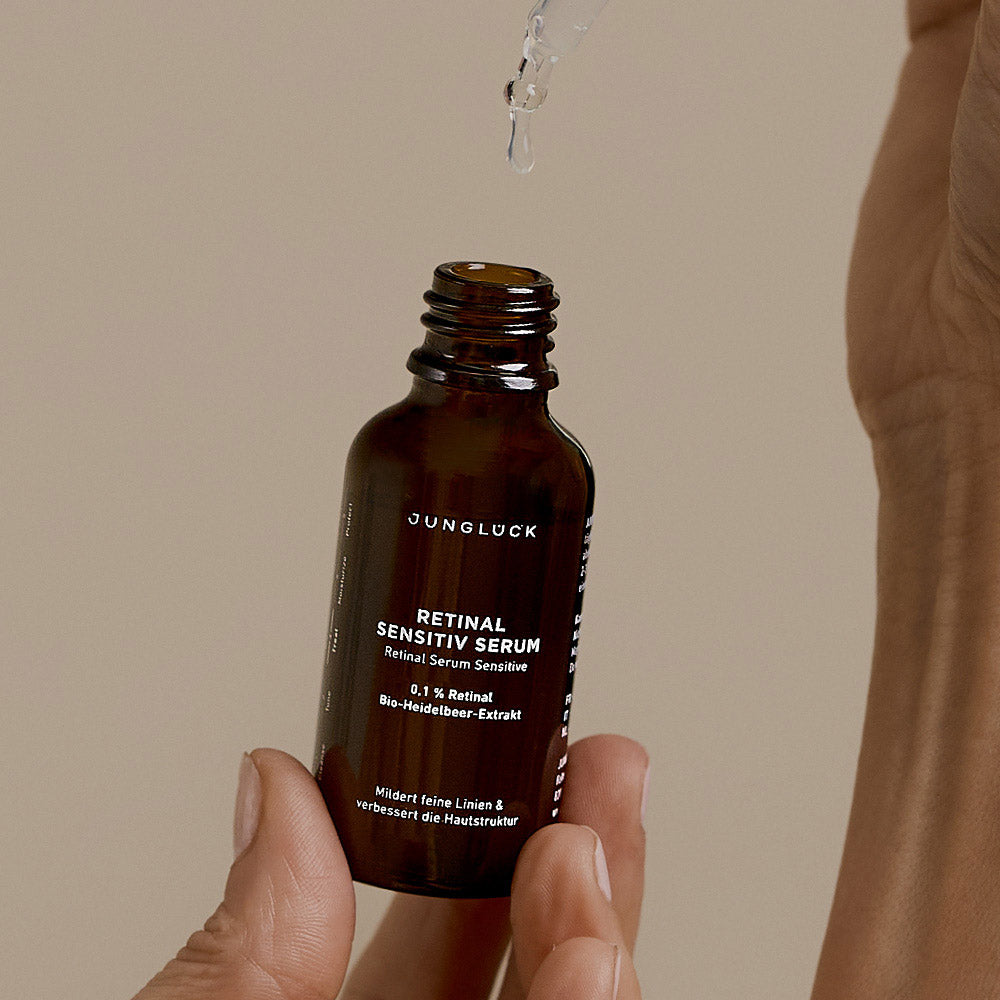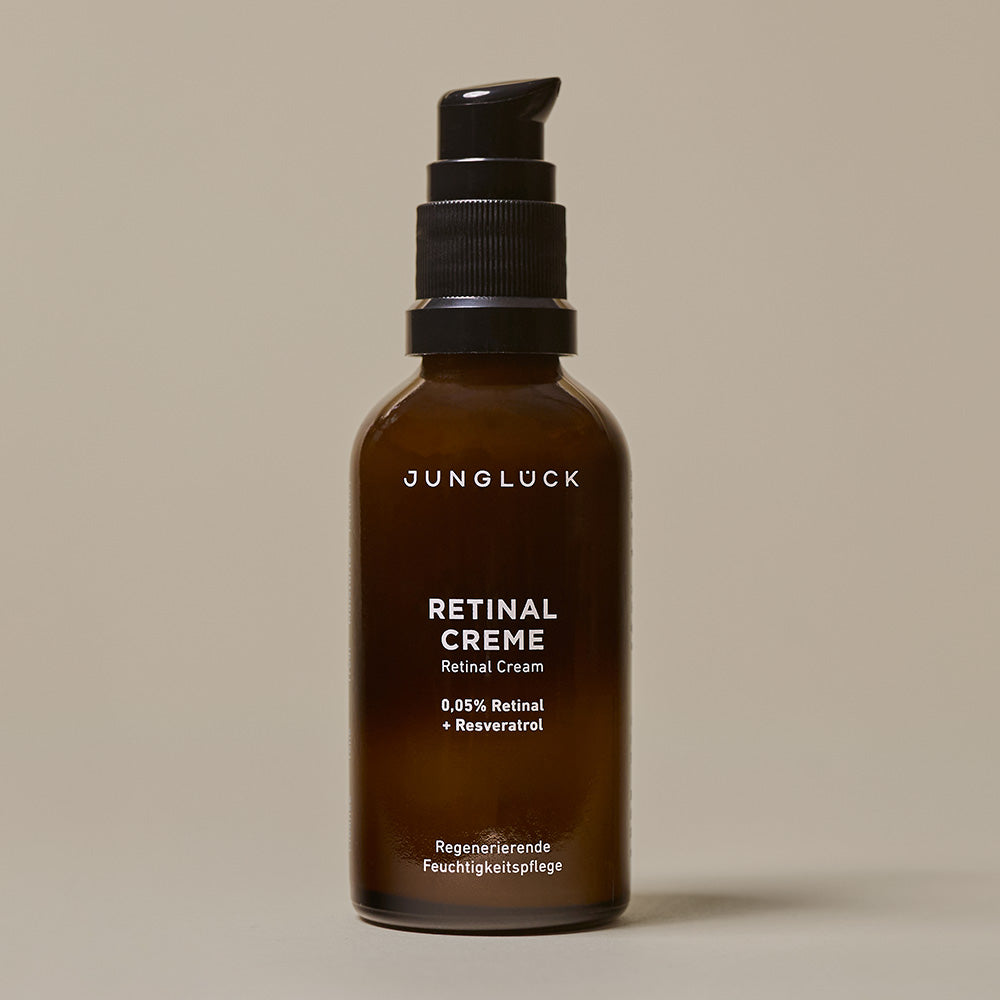well-aging Myths: Actives, light protection & Co.
ACTIVE INGREDIENT
RETINOIDS


AN INDISPENSABLE PART OF THE COSMETICS MARKET
The active ingredient vitamin A is probably better known by its various forms such as Retinol, retinal or retinyl palmitate. This group of different stages of vitamin A is often summarized under the generic term retinoids. In whatever form it is used, vitamin A actually has many great properties for your skin.
As an well-aging active ingredient, it has a double effect on wrinkles and lines and ensures firmer skin. The skin also benefits from its sebum-regulating effect when it comes to blemishes. Read on to find out exactly why vitamin AActives is so good and so effective and what you should definitely pay attention to when using it.
ALL RETINOIDS AT A GLANCE

WHAT IS THE DIFFERENCE?
Retinal and Retinol are both forms of vitamin A. At first glance, you may have wondered whether we made a typing error with the 'a' in Retinal. In fact, retinal is a separate active ingredient. In our diagram you can see the individual forms with their conversion steps. The closer a substance is to retinoic acid, the more effective it is.
RETINYL ESTER
Retinyl esters (retinyl palmitates, retinyl linoleates, etc.) are Retinol precursors that are only converted into Retinol in the skin through a chemical reaction. They are the most compatible retinoids, with a comparatively low efficacy, as they have three conversion steps to retinoic acid before their effect reaches the skin. During each of these conversion steps, part of the active potential is also lost.
RETINOL
The best-known retinoid is much more effective, as it only requires two steps to develop its effect: first to retinal, then to retinoic acid, the bioavailable form of vitamin A. This also requires higher concentrations to maintain its active potential. This also requires higher concentrations in order to maintain the active potential. However, this also increases the risk of irritation. It is therefore recommended to gradually accustom the skin to the active ingredient Retinol in order to avoid a skin reaction (skin purging).
RETINAL
Retinal only requires one conversion step. It is therefore more effective and reaches the skin more quickly, making it better tolerated. The lower concentration prevents it from accumulating in the skin and causing irritation. The conversion of retinal to retinoic acid takes place exclusively by keratinocytes in a specific differentiation stage, which leads to a controlled uptake of retinoic acid and fewer side effects such as skin irritation or redness compared to Retinol .
RETINIC ACID
The strongest retinoid is retinoic acid, also known as vitamin A acid or tretinoin. However, this form of vitamin A is only available on prescription and is therefore not permitted for the cosmetics market. The reason for this is that although retinoic acid is extremely effective against acne and sun-damaged skin, it also has a very high irritation potential for the skin and may therefore only be prescribed under medical supervision.
BAKUCHIOL - AN RETINOL ALTERNATIVE?
Bakuchiol is a herbal Retinol alternative and has little to do with real retinoids such as retinoic acid, retinal, Retinol and retinyl esters. It is obtained from the seeds of the babchi plant, a medicinal plant from the legume family that is used in classical Ayurvedic medicine. The chemical structure of bakuchiol is very different from that of Retinol. However, it acts partly on the same cellular pathways in the skin. Some studies suggest that Bakuchiol also has anti-ageing properties, but is less irritating than Retinol. This is the reason why Bakuchiol is being touted as THE Retinol alternative in the cosmetics world. The independent research on the anti-ageing effect of bakuchiol is rather poor compared to over 30 years of research on real retinoids. However, the effect of bakuchiol on spots and blemishes is better documented.
HOW Treat RETINOIDS OR VITAMIN A?
Vitamin A is essential for our body. Our health, our metabolism and our eyes depend on the vitamin. But it can also have many positive effects in skin care. Retinol and retinal improve and refine the skin's structure by stimulating cell renewal. They stimulate collagen synthesis and prevent collagen breakdown. Both contribute to smoothing, increase skin elasticity and ensure that loose horny scales are quickly removed. This stimulates cell renewal.
The difference between Retinol and Retinal therefore lies in their effect and tolerability. Retinal is more effective as a separate active ingredient, as Retinol is first converted to retinal in the skin before it becomes the pure form of vitamin A. Retinal only requires a single conversion step. This means that it works faster and is also considered to be better tolerated, as less retinal than Retinol is required for the same effect. This prevents the active ingredient from accumulating in the skin and causing irritation.
The increased moisture retention reduces wrinkles and lines. In addition, the rapid cell renewal reduces pimple marks and pigmentation spots. Even for acne prone skin an antibacterial effect has been found. Vitamin A thus ensures a finer skin texture on the surface and a stable foundation deep down. As antioxidants, Retinol and retinal inhibit the damaging effect of free radicals and Treat counteract premature skin ageing. This is why vitamin A plays such an important role in well-aging skin care, as it inhibits the breakdown of collagen and at the same time promotes the formation of new collagen.
THE ADVANTAGES
REFINEMENT OF THE SKIN STRUCTURE
Retinol as well as Retinal improve and refine the skin structure by stimulating cell renewal. They stimulate collagen synthesis and prevent collagen breakdown.
SMOOTHING OF THE SKIN
The increased moisture retention reduces wrinkles and lines, increases skin elasticity and ensures the rapid removal of loose horny scales.
REGENERATION OF THE CELLS
Retinol and retinal stimulate cell renewal and ensure that the old horny scales are shed more quickly. This helps the skin to regenerate more quickly.
INHIBITION OF INFLAMMATION
The cell renewal and sebum-regulating, antibacterial effect inhibits inflammation and reduces acne scars and pigmentation spots.
ALL PRODUCTS WITH RETINAL
WHO IS RETINAL SUITABLE FOR?
Combinability & interactions
If you have not yet used vitamin AActives for your Skincare , you should be patient with your skin. Depending on the dosage, we recommend that you gradually increase the application.
In any case, start with just one retinal product, preferably cream. Introduce the new active ingredient slowly so that your skin can get used to it. Give it time, as our skin also has a renewal cycle of 28 days. If you tolerate Retinal well, you can also combine Retinal Sensitive serum and Retinal cream for maximum results. We do not recommend combining them with other Retinol or Retinal products, as you should always consider the total concentration you are adding to your skin.
In terms of tolerance and to avoid overloading your skin, you should not combine higher doses of Retinol or Retinal products with other powerful ingredients. This applies in particular to combinations with chemical peels, such as AHA and BHA, as these thin the upper horny layer and allow Retinol to penetrate even more intensively and deeply.
Caution should be exercised with the following combinations of our products with retinal: AHA peeling, BHA peeling , Vitamin C ampoules .
We do not recommend using our Retinal products during pregnancy and breastfeeding. The reason for this is that retinoic acid or tretinoin is also used in acne medication. Due to possible side effects, these medications should not be used during this time. Whether the findings are transferable to cosmetics with retinoids is still unclear, so we just want to be on the safe side here.















